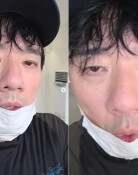Despite Surge in Organ Donor Registrations, Actual Donations Dwindling
Despite Surge in Organ Donor Registrations, Actual Donations Dwindling
Posted September. 22, 2005 07:44,
I am thankful more for one Japanese donor than for the five registered Korean donors. said Kim Sun-gyu (39), the mother of leukemia patient Lee Jeong-pyo (11). She prays in gratitude every morning in her house because the Japanese Marrow Donor Program told her in early September that it had found a marrow donor for her son.
At the end of March this year, her son Lee suddenly collapsed with his nose bleeding. He was diagnosed as having leukemia, and a marrow donation was his only hope. However, the marrow genes of his family members did not match with his.
After a month, Kim was finally told by the Korea Marrow Donor Program and the Catholic Hemopietic Stem Cell Bank that they had found five ideal donors for her son. However, the exhilaration did not exist long. The five all refused donation before close medical examination.
I was devastated. Four men said their parents wouldnt allow them to, and a woman thought about it over a month only to say no. Only one would be enough to save my sons life. It drove me crazy.
But a new hope came from an unexpected source: Japan. A 46 year-old Japanese male said yes. People over the age of 40 are not allowed to donate bone marrow in Korea, but those in Japan can. The overall cost in Japan for the donation and surgical operation is three times higher (68 million won) than in Korea, but it did not matter to Lee and his family, who were desperate.
In Korea, the number of people who are registered as organ donors is sharply increasing after the recent news broke of a renowned Buddhist priest who donated his body, in addition to campaigns by the media and civic groups launched at the end of last year.
However, the number of people who actually donate their organs is dwindling.
The number of donors who are registered with Koreas organ donation movement headquarters from January to July was 32,961, a 12-fold increase from 2,691 people, year-on-year. In contrast, the number of those who underwent organ transplant operations was 1,096 from January to August, shrinking from 1,169 over the same period last year.
Experts underscore that the government and donor raising organizations do little for donors after registration.
The Korea Institute for Health and Social Affairs found out last November that 29 percent of 2,500 donors registered in the Korean Network for Organ Sharing changed their contact phone numbers and were unable to be reached. Also, 58 percent said they had never been contacted by related organizations after registration.
A researcher at the Korea Institute for Health and Social Affairs said, The government is spending a mere 14,000 won a year for monitoring marrow donors and thus failing to effectively manage the donor pool. He added, Most registered marrow donors are likely to change their minds because either they are afraid or their family opposes it. It is important to keep them updated to make them actual donors.
European countries plant and grow trees, and the trees are given names after donors. In Canada, the prime minister invites donors every year to encourage them. In Korea, pride is the only reward they can get after the operation, said Choi Seung-ju, executive director of Koreas organ donation movement headquarters. We need to create a mood where donors can be respected and recognized in society, he added.
ditto@donga.com




![[김순덕의 도발] ‘李부터 연임’ 개헌, 이 대통령은 가능성을 말했다](https://dimg.donga.com/c/138/175/90/1/wps/NEWS/IMAGE/2026/01/16/133172656.1.jpg)


